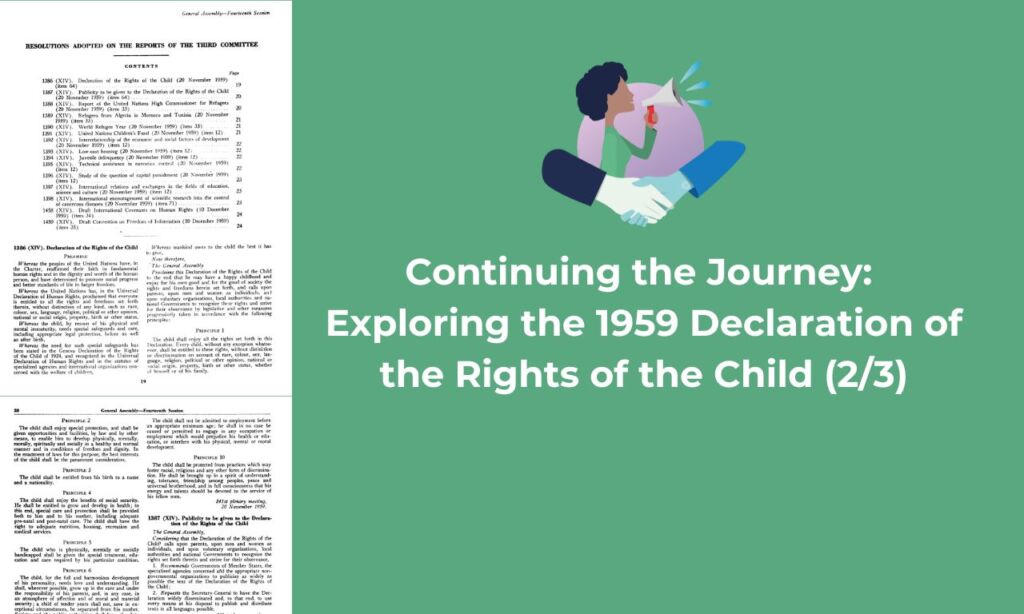
Continuing the Journey: Exploring the 1959 Declaration of the Rights of the Child (2/3)
- Written by: Apolline Foedit, PhD student in International History, the Graduate Institute, Geneva
- Pioneer advocacy
In this second part, we delve into the 1959 Declaration of the Rights of the Child, a pivotal document born out of the post-World War II era. It emerged from concerted efforts to reshape international discourse concerning children’s rights, well-being, and protection. From its inception to its eventual endorsement by the United Nations, the Declaration stands as a testament to humanity’s enduring commitment to safeguarding the rights and dignity of every child.
Following World War II, there was a concerted effort to establish and strengthen international organisations, notably the United Nations (UN). In 1945, two years after the creation of the United Nations Relief and Rehabilitation Administration (UNRRA) by 44 heads of state as a transitional administrative body, the UN was formally established during the San Francisco Conference. The UN aimed to promote international cooperation, peace, and security among nations. This included the creation of various specialised agencies within the UN system to address issues such as health, education, and human rights.
In 1946, discussions began to have the UN adopt the 1924 Geneva Declaration of the Rights of the Child, leading to the creation of the United Nations International Children’s Emergency Fund, known today as UNICEF. By 1950, a draft was prepared, but its presentation to the Assembly was delayed until 1957. Debate ensued over the necessity of a separate Declaration of the Rights of the Child alongside the Declaration of Human Rights. Eventually, on 20 November 1959, the UN General Assembly adopted the Declaration of the Rights of the Child, drawing from the structure and contents of the 1924 Declaration. It set out ten principles of fundamental rights for “a happy childhood”, recognizing that the child “by reason of his physical and mental immaturity, needs special safeguards and care, including appropriate legal protection, before as well as after birth”. The endorsement of the Declaration of the Rights of the Child by the Third Commission of the UN Assembly marked a significant milestone in international child welfare efforts. Since then, every year on 20 November, the United Nations celebrates International Children’s Rights Day.
However, two crucial non-governmental organisations in the field of children’s rights were hesitant to endorse the Declaration. The Save the Children International Union (SCIU), which later transformed into the International Union for Child Welfare (IUCW), and the International Association for the Promotion of Child Welfare, merged within the IUCW in 1946, faced the dilemma of endorsing either the old 1924 Declaration or the newly adopted United Nations Declaration. In 1960, the IUCW unanimously embraced the United Nations Declaration as its charter, signaling unity and collaboration in advancing child welfare worldwide.
Though primarily declaratory in nature, this text formed the foundation of what would later become the United Nations Convention on the Rights of the Child (CRC), adopted by the United Nations General Assembly on 20 November 1989. It already included major principles such as equality and non-discrimination among all children and the imperative to always seek the best interests of the child.
Tracing the historical trajectory from post-World War II efforts to the 1959 Declaration of the Rights of the Child, we witness humanity’s evolving commitment to protect the rights and dignity of every child. In the next article, we will explore the significance of the 1989 Declaration of the Rights of the Child and the ongoing quest for advancing children’s rights in the modern era.
For more readings:
Moody, Zoe. « La fabrication internationale des droits de l’enfant : genèse de la Déclaration des Nations Unies relative aux droits de l’enfant (1946-1959) », Relations internationales, vol. 161, no. 1, 2015, pp. 65-80.
Tara Zahra, « Les enfants “perdus”, migrations forcées, entre familles et nations dans l’Europe d’après-guerre », Revue d’histoire de l’enfance “irrégulière”, 2013, 15, pp. 23-74.
Also interesting is Andrée Morier’s 1963 article about the Declaration, that you can find in the Revue Internationale de la Croix-Rouge : https://international-review.icrc.org/fr/articles/la-declaration-des-droits-de-lenfant-0